Login
Registration enables users to use special features of this website, such as past
order histories, retained contact details for faster checkout, review submissions, and special promotions.
order histories, retained contact details for faster checkout, review submissions, and special promotions.
Forgot password?
Registration enables users to use special features of this website, such as past
order histories, retained contact details for faster checkout, review submissions, and special promotions.
order histories, retained contact details for faster checkout, review submissions, and special promotions.
Quick Order
Products
Antibodies
ELISA and Assay Kits
Research Areas
Infectious Disease
Resources
Purchasing
Reference Material
Contact Us
Location
Corporate Headquarters
Vector Laboratories, Inc.
6737 Mowry Ave
Newark, CA 94560
United States
Telephone Numbers
Customer Service: (800) 227-6666 / (650) 697-3600
Contact Us
Additional Contact Details
Login
Registration enables users to use special features of this website, such as past
order histories, retained contact details for faster checkout, review submissions, and special promotions.
order histories, retained contact details for faster checkout, review submissions, and special promotions.
Forgot password?
Registration enables users to use special features of this website, such as past
order histories, retained contact details for faster checkout, review submissions, and special promotions.
order histories, retained contact details for faster checkout, review submissions, and special promotions.
Quick Order
Search Results for “aminopeptidase N”
Pages with Related Content
ANPEP (also known as CD13, AAP, AP-N, LAP1, and P150) is a broad specificity alanyl aminopeptidase involved in the final digestion of peptides generated from hydrolysis of proteins by gastric and pancreatic proteases. It is thought to function in the metabolism of regulatory peptides of diverse cell types, responsible for the processing of peptide hormones (angiotensin III and IV), neuropeptides, and chemokines. It is thought to play an important role in the pathogenesis of cholesterol gallstone disease. ANPEP also cleaves antigen peptides bound to major histocompatibility complex class II molecules of presenting cells and serves to degrade neurotransmitters at synaptic junctions. Is also implicated as a regulator of IL-8 bioavailability in the endometrium, and therefore may contribute to the regulation of angiogenesis. It is used as a marker for acute myeloid leukemia and plays a role in tumor invasion. It is also a useful and specific marker for mature zymogenic chief cells (ZCs) present in gastric epithelium, and expression on ZCs is lost in transition to metaplasia in the stomach. In immunohistochemistry of normal tissue, ANPEP has membranous and cytoplasmic positivity in the prostate, liver, gallbladder, exocrine pancreas, intestine and renal tubules.
References: The UniProt Consortium. Nucleic Acids Res. 47: D506-515 (2019); Nucleic Acids Res. 2016 Jan 4;44(D1):D733-45, PMID:26553804; Am J Physiol Gastrointest Liver Physiol. 2015 Dec 15; 309(12): G955–G964, PMID: 26514774;
Viewing 1-1
of 1
site pages
for aminopeptidase N
Products
☰ Filters
Products
Antibodies
(158)
Proteins
(32)
ELISA Kits
(20)
Type
Custom
(4)
Over-Expression Cell Culture Supernatant
(1)
Primary
(158)
Recombinant
(31)
Sandwich
(16)
Target
ANPEP / CD13
(187)
ARTS1 / ERAP1
(1)
Dipeptidyl Peptidase 3 / DPP3
(2)
DPP6 / Dipeptidylpeptidase 6
(1)
ENPEP / Aminopeptidase A
(1)
ERAP2 / Aminopeptidase
(2)
LNPEP
(1)
LVRN / Laeverin
(1)
map/Methionine Aminopeptidase
(1)
MAP1D
(2)
METAP1
(2)
METAP2
(3)
pepA
(1)
pepP
(1)
PGCP / Aminopeptidase
(1)
RNPEP
(1)
XPNPEP3
(2)
Reactivity
Human
(135)
Mouse
(36)
Rat
(26)
Bovine
(5)
Chicken
(1)
Dog
(1)
Guinea pig
(3)
Horse
(5)
Monkey
(1)
Non-Human Primate
(5)
Non-Human Primates
(7)
Pig
(1)
Application
IHC
(53)
IHC-Fr
(28)
IHC-P
(30)
WB
(74)
Flo
(64)
ELISA
(31)
Func
(10)
ICC
(1)
IF
(11)
IHC-Fx
(1)
IP
(18)
Peptide-ELISA
(2)
Host
rabbit
(63)
mouse
(84)
rat
(10)
sheep
(1)
Product Group
Antibodies to Coronavirus-Associated Targets
(155)
Coronavirus Antibodies Proteins cDNAs
(166)
Coronavirus Detection
(20)
ELISA Kits for Associated Targets
(20)
IHCPlus
(2)
PathPlus Cancer
(1)
PathPlus Cancer Pathology
(1)
SARS-CoV-2 Associated Proteins
(11)
Isotype
IgG
(26)
IgG1
(44)
IgG1,k
(11)
IgG2a
(27)
IgG2a,k
(9)
IgG2b
(1)
Clonality
monoclonal mc
(95)
polyclonal pc
(63)
Clone
011
(1)
11
(1)
123H1
(1)
1C7D7
(1)
1G1
(1)
22A5
(9)
2F10
(2)
38C12
(3)
422
(1)
496CT9.1.1
(2)
505CT12.1.2
(2)
APN/514
(2)
B347
(1)
BF10
(2)
B-F10
(2)
CC81
(1)
CVS19
(2)
ER-BMDM1
(3)
OTI2E4
(2)
OTI3F8
(2)
R3-63
(4)
TUK 1
(2)
Tük 1
(2)
UMAB275
(2)
WM15
(20)
WM-15 (WM15)
(1)
Format
96-Well Microplate
(4)
96-Well Strip Plate
(16)
AF488 Conjugated
(1)
APC
(3)
APC Conjugated
(9)
Azide-free
(6)
Biotin Conjugated
(12)
BSA-free
(3)
Carrier-free
(4)
Concentrated
(3)
Cy3 Conjugated
(3)
Cy7 Conjugated
(3)
FITC Conjugated
(18)
HRP Conjugated
(9)
Low Endotoxin
(3)
PE Conjugated
(14)
PerCP Conjugated
(1)
Preservative Free
(6)
Ready-to-Use
(1)
RPE Conjugated
(5)
Unconjugated
(83)
Epitope
aa290-533
(8)
aa668-967
(8)
aa720-961
(8)
aa156-184
(7)
aa142-191
(4)
C-Terminus
(2)
881-930 aa, C-terminal
(1)
aa506-688
(1)
aa615-641
(1)
aa69-967
(1)
aa868-917
(1)
Publications
No
(210)
Sample Type
Cell Culture Supernatants
(5)
Cell Lysates
(1)
Plasma
(16)
Serum
(16)
Tissue Homogenates
(7)
Tag
10His, N-terminus
(1)
10His, N-terminus + Myc, C-terminus
(2)
6His, C-terminus
(2)
6His, N-terminus
(4)
6His, N-terminus + 6His, C-terminus
(4)
6His-SUMO, N-terminus
(4)
Fc, N-terminus
(1)
GST
(1)
GST, N-terminus
(3)
His
(1)
His, N-Terminal
(2)
His,C-terminus
(1)
His,N-terminus
(2)
His-T7
(3)
Myc-DDK (Flag)
(1)
Species
Human
(20)
Mouse
(5)
Mycobacterium tuberculosis
(1)
Mycoplasma pneumoniae
(3)
Pig
(1)
Rat
(2)
Source
Baculovirus
(2)
E. coli
(17)
HEK 293 Cells
(5)
Human Cells
(3)
Insect Cells
(1)
Wheat Germ Extract
(4)
Purification
Purified
(15)
Low Endotoxin Level
Low endotoxin level
(15)
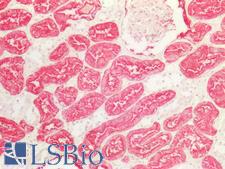
Cancer Pathology
Cancer
ANPEP / CD13 Mouse anti-Human Monoclonal (aa668-967) (2F10) Antibody
Human
IHC, IHC-P, WB
Unconjugated
50 µl/$460
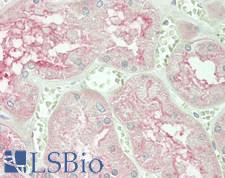
ANPEP / CD13 Mouse anti-Human Monoclonal (38C12) Antibody
Human
IHC, IHC-Fr, IHC-P
Unconjugated
0.05 ml/$460

ANPEP / CD13 Mouse anti-Human Monoclonal (38C12) Antibody
Human
IHC, IHC-Fr, IHC-P
Unconjugated
0.1 ml/$366
ANPEP / CD13 Mouse anti-Human Monoclonal (FITC) (22A5) Antibody
Human
Flo, IHC, IHC-Fr
FITC Conjugated
100 Tests/$365
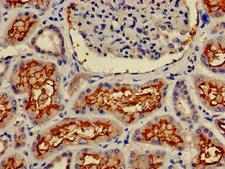
ANPEP / CD13 Rabbit anti-Human Polyclonal Antibody
Mouse, Human
ELISA, IF, IHC, IHC-P, WB
Unconjugated
50 µg/$294; 100 µg/$360
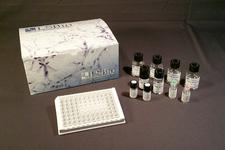
Sandwich
96-Well Strip Plate
Human
312 - 20000 pg/ml
Colorimetric - 450nm (TMB)
Cell Culture Supernatants, Plasma, Serum
1 Plate/$624
ANPEP / CD13 Mouse anti-Human Monoclonal (B347) Antibody
Human
Flo, IF, IHC
Unconjugated
0.2 mg/$328
ANPEP / CD13 Sheep anti-Human Polyclonal (aa69-967) Antibody
Human
ELISA, Flo, WB
Unconjugated
100 µg/$904

ANPEP / CD13 Rabbit anti-Rat Polyclonal (aa290-533) Antibody
Rat, Human
WB
Unconjugated
100 µl/$311; 200 µl/$355; 500 µl/$499; 1 ml/$571; 2 ml/$777; 5 ml/$1,261
ANPEP / CD13 Rat anti-Mouse Monoclonal (R3-63) Antibody
Mouse
Flo, IF, IHC-Fr, IHC-P
Unconjugated
0.1 mg/$280
ANPEP / CD13 Rat anti-Mouse Monoclonal (FITC) (R3-63) Antibody
Mouse
Flo, IHC, IHC-Fr
FITC Conjugated
25 µg/$172
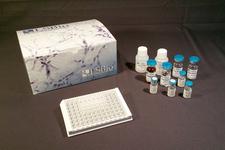
Sandwich
96-Well Strip Plate
Pig
0.156 - 10 ng/ml
Colorimetric - 450nm (TMB)
Plasma, Serum
1 Plate/$669
ANPEP / CD13 Mouse anti-Human Monoclonal (22A5) Antibody
Human
Flo, IHC, IHC-P
Unconjugated
100 µg/$411
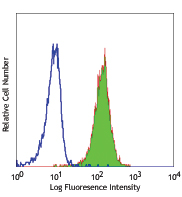
ANPEP / CD13 Mouse anti-Human Monoclonal (WM15) Antibody
Human
Flo, IHC, IHC-Fr
Unconjugated
25 µg/$246; 100 µg/$277
ANPEP / CD13 Rabbit anti-Human Monoclonal (Preservative Free) (011) Antibody
Human
ICC, IF
Unconjugated, Preservative Free
100 µl/$302
ANPEP / CD13 Rat anti-Mouse Monoclonal (ER-BMDM1) Antibody
Mouse
IHC, IHC-P
Unconjugated
100 µg/$728

ANPEP / CD13 Rabbit anti-Mouse Polyclonal (aa720-961) Antibody
Mouse, Rat
WB
Unconjugated
100 µl/$306; 200 µl/$347; 500 µl/$484; 1 ml/$553; 2 ml/$737; 5 ml/$1,206
ANPEP / CD13 Rat anti-Mouse Monoclonal (PE) Antibody
Mouse
Flo
PE Conjugated
100 Tests/$755
ANPEP / CD13 Mouse anti-Human Monoclonal (B-F10) Antibody
Human
Flo, IF, IHC, IHC-Fr
Unconjugated
20 µg/$371; 100 µg/$574
ANPEP / CD13 Mouse anti-Human Monoclonal (Azide-free, BSA-free) (B-F10) Antibody
Human
Flo, IF, IHC, IHC-Fr
Unconjugated, Azide-free, BSA-free
100 µg/$574
ANPEP / CD13 Mouse anti-Human Monoclonal (APN/514) Antibody
Human
Flo, IF, IHC, IHC-P
Unconjugated
20 µg/$371; 100 µg/$574
ANPEP / CD13 Mouse anti-Human Monoclonal (Azide-free, BSA-free) (APN/514) Antibody
Human
Flo, IF, IHC, IHC-P
Unconjugated, Azide-free, BSA-free
100 µg/$574
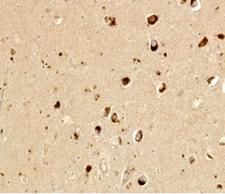
ANPEP / CD13 Mouse anti-Human Monoclonal (WM15) Antibody
Human
Flo, IF, IHC, IHC-P
Unconjugated
20 µg/$371; 100 µg/$574
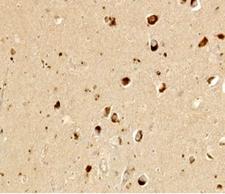
ANPEP / CD13 Mouse anti-Human Monoclonal (Azide-free, BSA-free) (WM15) Antibody
Human
Flo, IF, IHC, IHC-P
Unconjugated, Azide-free, BSA-free
100 µg/$574
ANPEP / CD13 Mouse anti-Horse Monoclonal (RPE) (CVS19) Antibody
Horse
Flo
RPE Conjugated
100 Tests/$557
Viewing 1-25
of 210
product results
for aminopeptidase N












